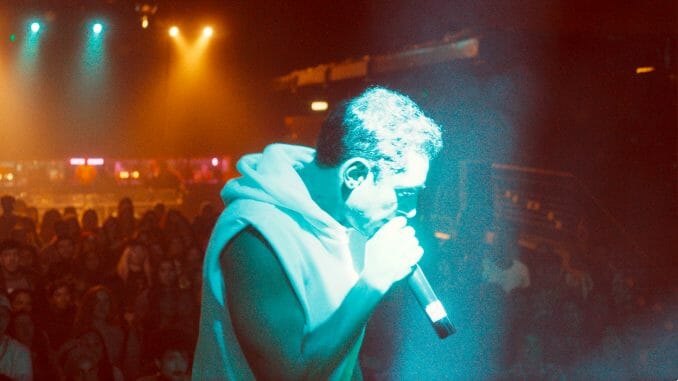You’ve Got to Know Who You Are If You Want to Live In Mogul Mowgli

The blurred line between actor, musician and performance is toed time and time again, whether it’s Eminem’s 8 Mile self-mythologizing, Prince’s Purple Rain showcase or the Beatles’ joyous multi-movie rampage. It can let us into the mind of an artist, revealing what’s most important to them. Admittedly, sometimes the result is simply “themselves,” but even that can be revealing if they’re willing to be introspective enough. Riz Ahmed, who’s been rapping far longer than he’s been known to the world as an actor, is following up a staggering performance in Sound of Metal with another role that places ego and artistic identity at its center—and it’s one that’s even more personal than his Oscar-nominated turn as newly deaf drummer Ruben. In Mogul Mowgli, which first-time writer Ahmed scripted with first-time fiction director Bassam Tariq, he’s politically conscious rapper Zed, whose fury and ambition run head-on into mortality after an unexpected medical diagnosis. Ahmed’s intimate performance and Tariq’s intense framing lend Mogul Mowgli a raw power that’s heady, heavy and a little heavy-handed.
Zed’s lyrics center on racism and Islamophobia, specifically the experiences of and prejudices faced by young British Pakistanis. Within a squat 4:3 aspect ratio’s claustrophobia—which instills plenty of dread (a fan approaching Zed outside a mosque) and anxiety (Zed struggling on parallel bars while the sounds of desperate physical therapy threaten to overwhelm him)—crowds cheer on his often unaccompanied bars. He’s relatively successful, but on the verge of truly breaking out. The musician’s been constantly paying his dues on tour, to the extent that his soon-to-be-ex ham-handedly foreshadows how little he’s seen his family—he’s traded interpersonal stability for a shot at the big time. There’s no good time for a debilitating autoimmune disease to strike, but for someone who’s put all the relationships that would be a comfort in times of struggle or illness on the line, the irony of its onset feels like targeted tragedy. Before he knows it, he’s hospitalized just as he starts reconnecting with his family and just as the window for “making it” begins to shut.
Ahmed’s vulnerable, stubborn hothead isn’t a far cry from Ruben, but this isn’t a study of addiction (whether to substances or senses). It’s a study of identity, simultaneously purer of intention and messier of execution. This broad topic—one close to many different diasporas and Nth generation immigrants—has found recent studious disciples in Ramy, with its constant reevaluation of traditions surrounding Islam, family and community; and even the latest Marvel movie, Shang-Chi, with its struggle to build beyond the imperfect influences and pressures of those that came before. In Mogul Mowgli, the questions are as in-your-face as Tariq’s camera.
Is Zed a bad son? A bad Muslim? He’s certainly not a bad rapper (at least in the fiction of the film; some of the songs are pretty one-note), but he’s unwilling to play the game. His younger peer—the face-tatted RPG, with his hilariously raunchy gangsta tracks—is every bit the personal and professional sellout Zed can’t bring himself to be. But he’s on his way up, a success. That contradiction of values and achievement is as threatening as the degenerative disease sapping Zed’s muscle mass. Zed’s prickly frustration and impotence become embodied after merely being imposed by a society that’s unbothered at best and antagonistic at worst. The chip on his shoulder becomes an inability to lift anything above his shoulder; his uneasy relationship with his family’s history becomes a hereditary disease.
-

-

-

-

-

-

-

-

-

-

-

-

-

-

-

-

-

-

-

-

-

-

-

-

-

-

-

-

-

-

-

-

-

-

-

-

-

-

-

-








































